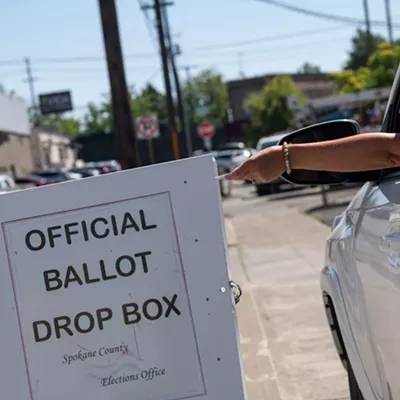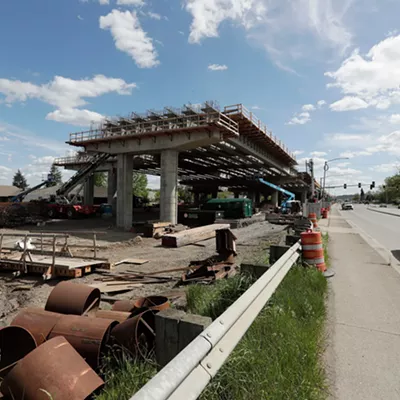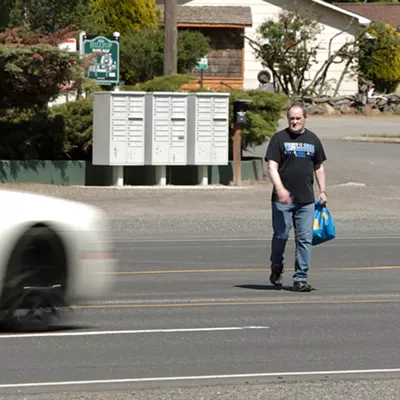The first step in solving the River Park Square parking garage controversy is to define the problem. It is clear we need a sound business solution for the River Park Square garage, but first we need a true understanding of why the project was built, and how the risks and benefits were shared. Any resolution must be crafted with the facts in mind about the promises made and benefits gained.
In the early-1990s, the harsh reality was that Spokane's downtown retail core was in serious decline. Two of the four major department stores that anchored downtown retail had closed. With J.C. Penney and Frederick & amp; Nelson gone, Nordstrom was close behind. Nordstrom's lease was to expire in 1999. A letter from Nordstrom put it this way: "Nordstrom has no current plans to exercise its option to extend the term of the existing lease..." If Nordstrom left Spokane, it was predicted that The Bon would close its downtown store. Without major anchor stores downtown, the retail core would disappear because, as in suburban malls, smaller retailers depend on traffic generated by the big anchors for their sales. Our region's center of commerce was in serious decline.
It did not take much imagination to see the disastrous impact if five to six city blocks bordering Riverfront Park went dark. Tacoma's then-dead downtown served as a warning of a future no one in Spokane wanted. Seattle had danced on the edge of extreme blight and crime before revitalization efforts emerged. Blight, crime and lost tax and job base would hit hard in Spokane. If City tax revenue from downtown plummeted, the City could be faced with raising property and other taxes citywide, or cutting services -- or both.
What could be done to turn a vision of downtown revitalization into reality? The River Park Square project emerged over the course of more than two years of public hearings and open, cooperative discussions between City leadership and our real estate company. As a result, the City agreed to pledge parking meter revenue in the case of a shortfall in the garage.
From the beginning, it was clear to all parties that without public support, the project could not be built. Just as in other cities taking on downtown revitalization efforts, neither the private nor the public sector could go it alone. Collaboration was a must. The financial package agreed upon by the City of Spokane and River Park Square was based on a balance of individual risk and benefit. Each party made its own decision to participate with its own independent advice and counsel.
A 1997 City Ordinance declared: "the City finds, based on studies, documents and public testimony presented to the Council, that the Project will:
1) provide new jobs to the Spokane area,
2) stimulate the economy,
3) provide cultural opportunities,
4) improve the quality of life through a reinvestment in the [Downtown], which will generate additional tax revenue and that the failure of the project to proceed will cause the City to suffer economic decline."
The new River Park Square opened in August 1999, bringing entertainment, dining and one-of-a-kind specialty shopping to downtown. Along with positive economic impacts would come the re-establishment of Spokane as a healthy regional center.
Today, the project is a net gain for the City and has delivered the benefits for which the City bargained. River Park Square has created or retained 1,100 jobs and exceeded the HUD job requirements. The project has sparked downtown revitalization. Since River Park Square opened, more than $350 million of new downtown projects have been completed or initiated. Not only that, but to date, River Park Square has generated more than $6.2 million in tax and fee revenue for the City and city services.
On the private side, we knew our investment would not generate a high return, but we agreed to invest in downtown because we are committed to helping make Spokane a livable, vibrant city. For four generations, we have cared deeply about Spokane and have been an active part of working with others to make it a better place to live, work and play.
Nevertheless, we made it clear to the City that without its participation, our return would become negative, which was not acceptable. If the redevelopment did not happen, our cost was the modest expense of demolishing the buildings and installing surface parking. The risk of going forward was the tens of millions of dollars to build, lease and operate the project. Our benefit was a revitalized, livable city, and a prospect of a relatively modest return upon an enormous investment. We have achieved the first. We have not achieved the second, but hope that someday we will.
On the public side, the City knew it faced a multi-million dollar decline in its tax base, a significant drop in the job base and the incursion of crime and blight into the downtown core. The City, however, could turn the tide by taking on the responsibility and limited risk associated with a parking garage. In exchange, the City stood to gain: (1) a new parking garage, which it would own free and clear once bonds were repaid; (2) millions in fees, property and sales taxes generated by the project; (3) job creation for its citizens; and (4) further downtown revitalization projects, which would generate their own benefits. The City received all of this, even after taking into consideration the current garage losses.
The parking garage has not performed as expected, but there is a steady upward trend in utilization and revenue. The garage is 24 percent ahead of last year and well on the way to parking more than 900,000 cars this year. What has the City done to help? The City has initiated litigation that has cost taxpayers more than $1 million in legal fees and two bond-rating downgrades. But for the bondholders' attorneys' fees, the garage would generate sufficient revenue to cover the bond payments. This focus on litigation has also meant that, collectively, the parties have spent in legal fees more than the garage has lost. In addition, part of the unpaid rent that the City promised to cover is committed to repayment of the HUD loan. Each month the City continues to flout its pledge, the risk to the HUD loan increases.
So how can we all move on? Any solution must be fair, equitable and comprehensive, taking into consideration the benefits to the City and the solemn promises it made. It is a fact that even if the City had paid every nickel it owes according to the binding legal promise it made (it has paid nothing so far), the City would be making money from the River Park Square project.
Annual projected taxes and fees generated by River Park Square alone (that is, not including taxes generated by The Bon and other downtown retail that would not be there today but for the project or the related $600,000 annual increase in parking meter revenue) is an estimated $2 million today. Even assuming that the garage were to continue indefinitely to experience a shortfall of $1.7 million a year, $2 million (City benefit) minus $1.7 million (City risk) leaves an annual net gain to the City of $300,000. That is an 18 percent return. Add that to a vibrant downtown that rivals most other cities in the country, and Spokane is a far cry from the brink where it stood only a few years ago.
River Park Square is a $115 million project. Our company invested nearly $15 million more than originally planned, and our return on investment is negative. That was a risk our company took. We have made no demand upon the City for help because, like the City, we knowingly accepted that risk. Unlike the City, we have met our obligations.
An equitable and comprehensive solution will be based upon the promises the parties made and the benefits received. Any proposal that refuses to acknowledge how the City has benefited and to what extent, or that supposes the City did not promise to cover unforeseen contingencies, is simply unfair to all the others that have made significant investments and delivered on their commitments.
I ask the City Council and Mayor to refocus on the reality of why the project was built, to fairly evaluate the risks it took on and the benefits it has received, and to put politics and litigation aside. It is high time we got past the rhetoric and sound bites, and got to real discussions about real solutions based on real facts. If we can't do that, the lawyers will continue to eat up all the benefits that should and could be flowing into the City's general fund.
Betsy Cowles is president of River Park Square LLC.
















